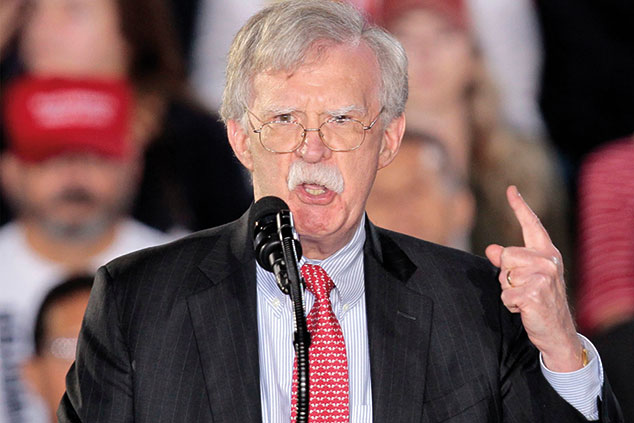
Tensions “spiked” in the Gulf when an Iran-backed group attacked Saudi oil facilities and the US accused Tehran of being behind a series of “unexplained sabotage attacks” on commercial vessels heading for the Strait of Hormuz, says Ladane Nasseri on Bloomberg.
In response, America has sent an aircraft carrier to the Gulf and has threatened military action if there are any further attacks on shipping. The latest events come in the wake of Iran’s threat earlier this month to restart its nuclear programme, which it suspended four years ago, and have “increased concerns of a military confrontation, whether deliberate or otherwise”.
Many people are blaming the US for the “rising tensions”, says The Economist. Last year President Donald Trump pulled out of a deal that curbed Iran’s nuclear programme in return for economic relief and has recently begun “imposing crippling sanctions on Iran”.
There are concerns about the growing influence of John Bolton, Trump’s national security adviser, who has repeatedly argued that “America should bomb Iran to set back its nuclear programme”. Indeed, the quickness with which the US blamed Iran for the attacks on Gulf shipping has led to speculation that Trump and Bolton “may be trying to provoke Iran into striking first”.
New deal still possible
It’s wrong to blame America, says Con Coughlin in The Daily Telegraph. Iran needs to be brought under control because it has taken advantage of the previous deal to expand its military presence “throughout the Middle East in countries such as Syria, Iraq and Lebanon”. It has also “actively sought to foment political instability in some of Washington’s key regional Gulf allies”.
The Americans have repeatedly said they are open to another nuclear agreement, provided it focuses on “all aspects of Iran’s attempts to acquire nuclear weapons”. So responsibility for this crisis lies with the ayatollahs who have attempted to “divert the attention” of the “restless” Iranian people by “raising the prospect of a fresh confrontation with the West”.
The US is right to be concerned about Iran’s “malign regional influence”, and there are “legitimate” questions about its wider missile programme, says the FT. But a “comprehensive deal” that resolves all questions about Iran’s nuclear ambitions and involvement in regional terror is “not achievable” at the moment. For all its faults, the previous accord “at least succeeded in its main goal – suspending Iran’s atomic programme and easing an international crisis that threatened to spark a regional arms race”. Given time, it could have “laid the foundation” for negotiations on a wider deal.
The risk of an escalation is now “worryingly high”, with the US drawing up contingency plans to send 120,000 troops in the event of conflict, though there are still hopes that “cooler heads will prevail”, says The Times. Trump “was elected on a promise to put an end to America’s foreign adventures” and up until now he has “proved reluctant to commit to deploy US forces”. So Trump “urgently needs a foreign policy success”. He told Iran’s leaders last week to “call me and make a deal”. Tehran should refrain from further provocations and instead “pick up the phone”.